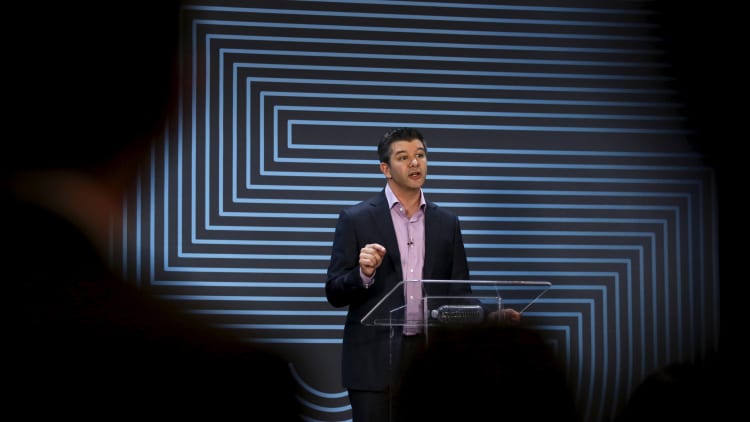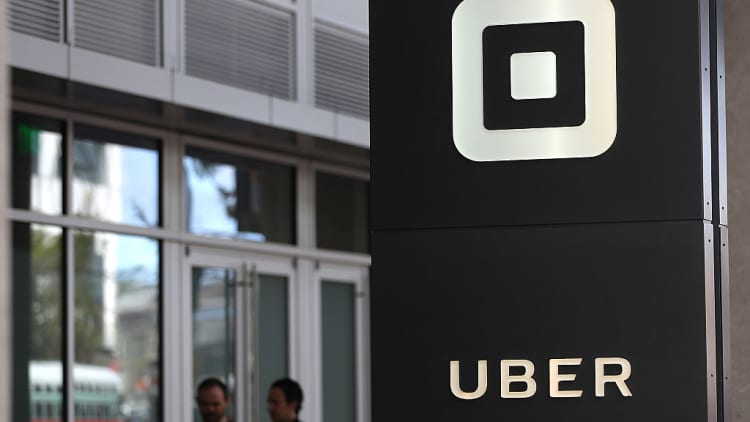
It's been a bad month for some tech CEOs in Silicon Valley, most particularly Uber CEO Travis Kalanick.
When we last checked in with the always pugnacious leader of the car-hailing company, he was getting shaken down by the the mayor of Pittsburgh, seeing accidents and regulators plague his troubled self-driving car efforts and getting tsk-tsked for taking some Uber employees to an escort bar in South Korea.
In all fairness, if you actually wanted to be fair about this kind of thing, it turns out to be a not uncommon thing for tech execs visiting Asia to do. This obviously sucks, especially for staffers who have to attend and don't feel comfortable about it, like the female Uber employee who complained to HR about that visit. And while I am not trying to make a molehill out of a mountain — and this is most certainly one of the many big and ugly pinnacles of sexism — I was on the receiving end of a million people telling me their escort bar tales in the last two weeks.
More from Recode:
- Full transcript: Craig Finn of The Hold Steady on Recode Media
- With its Galaxy S8, Samsung is building a powerful platform without an OS
- Roku has hired a team of lobbyists as it gears up for a net neutrality fight
But since this was Kalanick as the protagonist, it's 150 percent ickier and another public mess that is part of the continuing reverberations after a series of firings and departures related to issues of sexism and sexual harassment and what sounds like epically dysfunctional management systems at the much-funded startup.
There was also the #deleteuber meme, the unfortunate back and forth with whether to be part of President Donald Trump's advisory council and — lest we forget — Kalanick starring in a video made by a disgruntled driver, in which he looked like the d-bro most people imagine him to be.
He got jiggy, he got piggy, he got wiggy.
Which is why I joked on CNBC earlier this week that if Travis saved a kitten from a tree these days, he'd be accused of animal abuse. I was kidding, obvi, as I was when I had earlier suggested to an Uber investor that the CEO should be locked in a room and not allowed to do anything but order in from UberEats for at least eight weeks.
"If the PR were better, it wouldn't be like this," was the response. I would have been dumbfounded had I not already heard it three other times before that from others inside and outside Uber — this cockamamie notion that the messed-up communications around all these disasters was the real problem ailing Uber.
One person suggested that hiring an outside crisis PR firm — those pros that come in when the situation gets too hot — would fix things stat. "They'd know what to do," he said, as if there was some magic bullet to shoot that would kill off all the bad.
Another claimed that there should be no statements at all from the company, so that it would all blow over sooner. He even complimented another Uber investor and board member Bill Gurley for not saying anything at all publicly about the problems, despite the venture capitalist's well-known proclivity to give stern public lectures about a range of shortcomings by other startups. But is Silent Bill the kind of symbol of rectitude we need right now? No, he is not.
And the third exec? He said that the best thing for Uber would be to be Uber again — no more PR-engineered public apologizing and get back to what got the company so big in the first place. Which is to say, overweening aggression. Which, I might add, is what got the company into trouble in the first place.
"It's a PR problem, with the media piling on," said this person. "And PR can fix it. Let Uber be Uber"
Let's not let it, shall we?
It's moments like these that I am not entirely sure I live in a real adult place called Silicon Valley anymore. Instead, when I hear such elaborate justifications, it feels like it is increasingly becoming an environment that abrogates responsibility for actual actions that have actual consequences.

If this sounds like tactics that seem to be working for teenagers and also President Donald Trump, you'd be right. His twist, of course, is even more elaborate — lie and then keep lying until you exhaust everyone around you and your non-facts slowly equalize with the truth. It does not matter the topic — birtherism, wiretapping, crowd size — as long as a consistent level of fibbing is energetically deployed.
Now, tech has not gotten quite that bad. But it does need to stop blaming PR for bad management and perhaps focus on the actual thing instead of how the thing looks.
As my favorite — and the most mature adult — CEO I have covered, Jim Barksdale of Netscape, used to say famously: "The main thing is to keep the main thing, the main thing."
I get why that is not easy. Taking a hard look at yourself is not natural among entrepreneurs, who need to tell themselves all kinds of little lies to push through during really hard times and difficult junctures endemic to any uncertain venture. But looking hard is what needs to happen at Uber, which cannot afford to play the blame game at this point.
Instead, it needs to take it for now, both publicly and privately, as it works to fix the very deep problems it has. It has to take it even if the reports seem a little unfair and even if they might even be
Consider a fascinating story in the New York Times about how Uber uses "psychological tricks" to get more out of its drivers. "The company has undertaken an extraordinary experiment in behavioral science to subtly entice an independent
That's essentially the same way a slot machine makes you feel, but it sounded more sinister that Uber was doing it. And maybe it is, except for the fact that in this game of digital attention grabbing, Uber is a piker compared to the mind-messing masters over at Facebook, the puzzle palace of Google and the folks over at Amazon who can get you to push any button they want you to. (Point of fact: I just bought three yoga mats on Prime and I have no idea why. But delivery is free!)
But they are not the ones on trial now, so they get a pass for this, even as Uber suffers the slings and arrows of outrageous fortune.
Thus, those who keep insisting to me that PR is the problem for Uber, have to catch a clue: The company is having troubles because it neglected to put key human resources and management systems in place that would counter its rich-frat-boy-meets-Vegas tendencies. It needs to do that now and quickly, it needs to complete a thorough and independent investigation that names names and exacts some form of justice.
And Uber is not the only one — it's the same all over tech. Wanna know why Yahoo failed? Was it Recode constantly reporting on its many missteps? Was it because the media got all mean on CEO Marissa Mayer? I would be happy to take a bow, but it's because of more management missteps than you can count, because of deep secular changes in its business and, mostly, because of a basic lack of innovation in its products.
The same is true over at Twitter, which has been less whiny about its situation. While it does get outsize attention from the media because the media — and President Donald Trump — love the platform, its issues are hardly anything that a great PR push could repair. It has to fix its products, its business model, how it keeps and motivates its employees. A nice big profile in Fortune about the wit and whimsy of Jack Dorsey is not going to do that. (For the record, though, I can report that Dorsey is very witty and often quite whimsical.)
I could give example after example of stories that got enormous coverage, even though that coverage had nothing to do with the problem or the solution. How did Microsoft come out of its nadir after it was sued by the U.S. government for being a monopolist? It changed. How did Facebook get over a series of dumb moves it made in its early days? It grew up. How did Apple deal with the controversies around its factory workers in China? It shifted its practices.
And remember when Amazon had all those business troubles in 1999 and was widely called Amazon.bomb?
No, neither do I.
—By Kara Swisher, Re/code.net.
CNBC's parent NBCUniversal is an investor in Recode's parent Vox, and the companies have a content-sharing arrangement.



